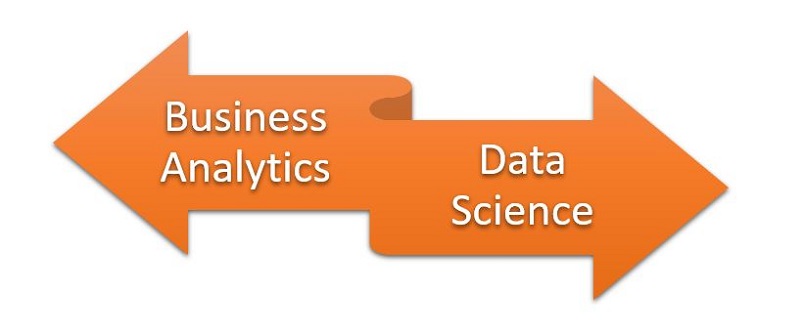Business Analytics v/s MS in Data Science: Which is better?

Candidates looking to pursue further studies in Business Analytics or Data Science are often confused between the two. Hence we have tried to individually talk about the courses and elucidate the difference between the two, for students to make a more conscious effort while planning ahead. In this article, we are going to talk about Business Analytics, Data Science and dive into the differences between the two.
- What is Business Analytics?
- What is Data Science?
- What is the difference between Business Analytics and Data Science?
What is Business Analytics?
Business Analytics can be described as a study involving the amalgamation of data analytics and business intelligence on a given set of data to undertake future business strategies and plans. Business Analytics is taught as a specialization while pursuing your Master of Business Management (MBA).
Studying Business Analytics typically involves the evaluation and study of available data to gain an understanding of the planning and execution of future business strategies and goals. Candidates having pursued Business Analytics would be able to optimize operations, increase revenue by saving on operational cost, improve better customer relation, and predict future trends in the market thereby enabling accurate strategic decisions and business plans.
Top Universities for Business Analytics
Candidates wanting to pursue Business Analytics can check out popular universities offering the same.
- Massachusetts Institute of Technology (MIT)
- Imperial College London
- The University of Texas at Austin (UT Austin)
- ESSEC Business School - France
- ESADE Business School (ESADE)
Who can pursue Business Analytics?
Eligibility for Business Analytics would require candidates to be a Graduate or equivalent. They would also be required to have GMAT scores or GRE exam scores and also appear for an English Proficiency test such as IELTS, TOEFL or PTE. However, it is always recommended for candidates to check with their university eligibility guidelines to know about the complete admission criteria.
Related Reads
What is Data Science?
Data Science involves the process of examining data sets to draw conclusions on the basis of information available in them with the help of various software or specialized systems. Data Science has over the years grown into a booming skillset as it enables carrying out more-informed business decisions based on scientific data and research.
Predict your IELTS, TOEFL, and PTE in just 4 steps!
Tools used in procuring Data Science help scientists and researchers in verifying or rejecting scientific models, theories and hypotheses, thereby helping businesses improve operational efficiency and customer service, gain a competitive edge and increase revenues. There are two forms of Data Science: Quantitative Data Science and Qualitative Data Science.
Top colleges for Data Science
Candidates wanting to pursue Data Science can check out popular universities offering the same.
- Columbia University (CU)
- New York University (NYU)
- Carnegie Mellon University - USA (CMU)
- Northwestern University
- University of Cincinnati (UC)
Eligibility Criteria for Data Science
Candidates wanting to pursue Data Science should have completed their graduation or equivalent preferably in Science or Computer Science from a recognized university. They would also be required to appear for an English proficiency exam and have qualifying PTE scores, IELTS scores or TOEFL scores. Universities could also require students to provide their GMAT/ GRE scorecard during the time of their application. It is always advisable for candidates to check the university admission guidelines to know about the complete admission criteria.
Related reads
- Top Master of Data Science Colleges in the USA
- Top Master of Data Science Colleges in Canada
- Top Master of Data Science Colleges in Germany
- Top Master of Data Science Colleges in Australia
- Top Master of Data Science Colleges in Ireland
What is the difference between Business Analytics and Data Science?
Confused about pursuing Data Science or Business Analytics? Check out the major differences between pursuing Data Science and Business Analytics in the table provided below.
| Data Science |
Business Analytics |
|---|---|
| Involves the science of data study using statistics, algorithms, and technology |
Is defined as the Statistical study of business data |
| Involves a lot of coding skills |
Involves minimal coding skills |
| Analysis results of Data Science cannot be used on day to day decision making of the company |
Analytics is often vital in making key decisions by management |
| The study does not answer clear-cut questions. The questions are mostly general in nature |
The study answers very specific business-related questions mostly financial |
| Data Science uses both structured and unstructured data |
Business Analytics uses mostly structured data |
| Data Science has the potential to take leaps and bounds especially with the coming up of Machine Learning and Artificial Intelligence |
Business Analytics is yet to foray into artificial intelligence |
| Data Science depends largely on the availability of data |
This is not the case for Business Analytics |
Also read: Data Science vs Machine Learning
Businesses can expect a major shift in the way data is analyzed, given the recent developments in both Data Science and Business Analytics. With Big Data being rapidly available, business organizations will have the opportunity to explore different varieties of data and help the management make key decisions. Interpretation of available data will allow management a chance to know where they will stand in the near future and hence, would want to make confident decisions today.
Candidates should keep in mind that gone are the days when analysis just involved statistics and survey data. Data Science and Business Analytics offer employees multiple opportunities to learn and improve themselves. With changing data and learning trends, Data Science and Business Analytics opportunities that lay ahead are plenty and candidates wanting to pursue these copurse4s should make the most of the opportunity.
Pick your stage and get free guidance from counsellors who've helped thousands get into top universities.
 Starting research
Starting research Shortlisting colleges
Shortlisting colleges Exam preparation
Exam preparation SOP/LOR writing
SOP/LOR writing Scholarship & finance
Scholarship & finance Visa application
Visa application


Comments